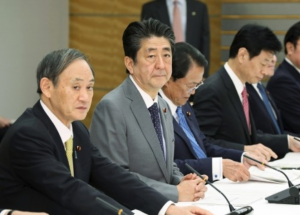Public distrust of the Abe administration has reached an all-time high, with Shinzo Abe’s approval rating falling to 27 percent over the weekend according to media polls. Public support has fallen by 17 percentage points in six weeks, down from a 44 percent rating in an early April media poll.
In addition to criticism of Abe’s handling of the coronavirus outbreak, the Japanese prime minster is embroiled in a fresh favoritism scandal centered on a bid to allow cabinet approval to extend the mandatory retirement age for top public prosecutors by three years.
The legal revision to the Public Prosecutor’s Office Law is widely believed to have one aim: to make room for close Abe ally Hiromu Kurokawa, the chief of Tokyo’s High Public Prosecutor’s Office, to take on the highest rank of prosecutor general. The proposed revisions would enable the cabinet to decide which prosecutors can stay in office past the normal retirement age. Abe has maintained that the government exemption is a way to retain senior officials with the “knowledge and experience” to deal with “complicated and sophisticated” administrative issues.
But a surge of social media backlash called out the cabinet’s decision as a politically motivated abuse of power. Online protesters also took issue with the timing, criticizing the government for pushing a bill in the current Diet session when they should be prioritizing saving lives during the COVID-19 pandemic.
To critics, the bill is a move to keep close allies to the Abe administration in positions of power by allowing the cabinet to exert influence over the administrative and personnel affairs of the prosecutor’s office. Legal experts argue the separation of powers and a fair judicial system would be in jeopardy, along with the political independence and neutrality of prosecutors.
Japanese celebrities such as pop star Kyary Pamyu Pamyu led online protests by reposting the hashtag “I oppose the revision to the Public Prosecutors Office Law,” which reached over 3.8 million shares in two days on Twitter. One actor called for politics and law not to be intertwined, arguing the move could destroy the country.
The avalanche of public outrage forced the government to postpone the lower house vote on the controversial amendment of the Public Prosecutor’s Office bill. On May 18, Abe conceded it was important to listen sincerely to the voice of the public but maintained that even if the amendment had gone through, the cabinet would not meddle in the personal affairs of prosecutors.
However, the opposition warned the revision to the bill has simply been put on hold in the current Diet session. The provision that would allow prosecutors to extend their retirement age has not been withdrawn and is technically still under deliberation. Constitutional Democratic Party of Japan representative Yukio Edano said he would fight a continued campaign with the cooperation of opposition parties to ensure the bill is abolished, stressing the ruling Liberal Democratic Party (LDP) may push for the legislation again in the autumn. Edano also lashed out at the lack of responsibility taken by the cabinet as a whole, saying the government’s refusal to abolish the bill illustrates their nonchalant view on the matter.
On Friday, Abe said that he wouldn’t be able to move forward with the legal amendment without understanding from the public but hinted that he would not rule out reconsidering the bill at a later time.
An approval rating below 30 percent is commonly viewed as the danger zone for Japanese premiers. But Abe, who is serving his third straight term as prime minister, is no stranger to political scandals. He has weathered a string of controversies since taking office 2012, most recently in January 2020 after extending Kurokawa’s tenure by six months as he was nearing the retirement age of 63.
Abe has since backpedaled on his personal involvement in defending Kurokawa, conceding “final responsibility” in accepting the cabinet’s approval. Meanwhile, Japan’s Mainichi Shimbun reported that after filing a freedom of information request it found the Ministry of Justice failed to keep a record of official meetings discussing extending the retirement age of prosecutors, fueling public mistrust over the decision-making process behind the legal amendment.
On Friday, in an unrelated turn of events, Kurokawa submitted his resignation after a weekly tabloid magazine, Shukan Bunshun, reported that he had visited the home of a journalist to illegally gamble on a game of Mahjong — while also breaking the government’s emergency stay-at-home requests amid the COVID-19 pandemic.

































